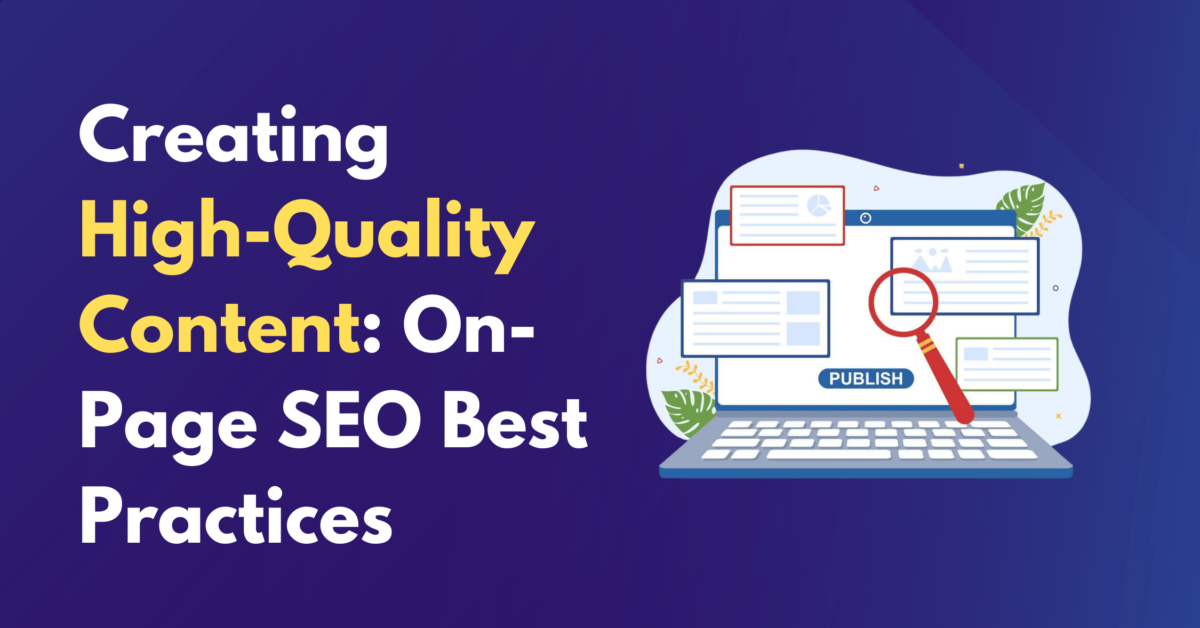Creating High-Quality Content: On-Page SEO Best Practices
When you hit the publish button on your latest blog post, you have an extraordinary opportunity to engage your customers and influence their behaviors. But how precisely do you create high-quality, SEO-friendly content that attracts customers and performs well in search engine results?
In this post, we’ll set aside the technical aspects of SEO for a moment and concentrate on engaging writing that engages readers, which is equally important to search engines.
Even though algorithms continue to operate in the background, thanks to modern SEO, a lot of the requirements for high-ranking content are frequently met by the content that your customers want to read.
Read on as we explore what is quality content for SEO, its importance, and best SEO practices.
What Is Quality Content for SEO?
Although algorithms have advanced to the point where they can now evaluate the language on the page to establish overall context and meaning, keywords still play an important part in helping people locate your content. Rich, useful information that provides a wonderful user experience may be found by search engines.
High-quality SEO content:
Appeals to your customer.
Offer content that is compelling, easy to read, and interesting.
Answers user queries.
Knowing the search terms your customers use to try to solve a problem will help you deliver High-Quality Content at the appropriate touchpoints that address their needs and concerns.
Is reliable and trustworthy.
Establish the authority and credibility of your website and your content to demonstrate your subject-matter expertise.
Is easily understood by search engines.
Employ SEO best practices to optimize your content and website for search bots.
Also Read: How Long Does It Take to See SEO Results?
Importance of Quality Content for SEO
As a marketer, you have a chance to engage your audience each time they type a relevant query into the search box. When making a decision to buy, learning about products and solutions, researching a problem, and learning about your particular brand are all times when people typically turn to Google.
You increase your chances of ranking higher in search engine results when you produce the kind of interesting, comprehensive, and trustworthy content they seek out.
You also fulfill your business objectives — by satisfying your target audience’s informational needs, you can drive traffic to your site and bring customers into your sales funnel.
List of SEO Best Practices
Here are the best SEO practices that you should implement today:
Use your primary keyword effectively
Incorporating your primary keyword or target keyword effectively is essential for SEO success. In order for your High-Quality Content to rank, this keyword should accurately summarize the subject of your blog post.
Utilize your primary keyword in these 4 crucial places on your page:
H1 page title: Put the keyword in the page title or title tag’s first position. Searchers tend to scan, frequently only reading the first two words of a title, so the likelihood that they will click on your site increases if they can see that the headline corresponds to their search terms.
Header tags: It’s important to include your main keyword and variations in some of your header tags, such as H2 and H3, to help give context to your content for search engines.
Meta descriptions: This tells readers what your content is about and whether it will help them. Verify that your description contains your main keywords.
URLs: Readers and search engines can understand what the content of your page is about by using your main keyword in the URL.
Also Read: Mastering On-Page SEO Techniques: A Comprehensive Guide
Ensure that your URLs are SEO-friendly.
Include internal links
Add internal links to your content as you expand it to help readers navigate your website. Internal links help improve user experience, directing readers to important pages such as products or services and additional resources that may be of interest.
As visitors gather information to guide their purchasing decisions, these links assist in keeping them on your website. They’re useful for highlighting older but still useful pages in your archives that readers might otherwise overlook.
Internal links improve the usability of your website for visitors while also providing search engines with context by demonstrating how pages are related, particularly if you use clear anchor text to clearly state where a link will take the user.
Links are particularly useful for distributing authority among sites, which can improve ranking. Link equity is the term for this. A page that performs well and that Google already deems authoritative can transfer part of its authority through links to another page.
The following advice will help you optimize your internal linking strategy:
- Link within related pages in a topic cluster to signal a content hub on your website. This will help establish the topical authority of your links and guarantee that they are semantically connected.
- Make sure to link to new pages from older ones whenever possible because older content on your site has a tendency to be more authoritative than newer content.
- Use variations in your anchor text.
- Don’t link to every page. Link to pages related to your topic if your website is still relatively fresh. It’s OK for authority sites to connect to pages outside the topic cluster.
- Ensure all the web pages on your site are linked so you don’t have any pages without internal links to them. Google will have a harder time finding, crawling, and indexing content on your website if there are no pages linking to it.
Don’t forget to include external links. Your standing may improve if you affiliate with reputable websites.
Build backlinks
- We are aware that backlinks are an established ranking factor that must be considered in your SEO plan.
- A website with few or no backlinks is comparable to an uninhabited island on the vast internet.
- It’s harder for search engines to discover and index such websites, which can lead to lower visibility in search engine results pages.
- This lack of visibility can result in fewer visitors, less brand exposure, and ultimately, lower revenue.
- Your website’s SEO rating may be greatly enhanced when other websites link to it, which tells search engines that your material is worthwhile and relevant.
- Moreover, backlinks can also drive direct traffic to your site, increasing your audience and potential customer base.
Here are several ways to acquire backlinks to relevant pages:
- creating high-quality content, shareable content
- guest blogging on reputable sites
- building relationships with influencers and other relevant websites in your industry
- digital PR tactics such as press releases and HARO-style outreach to journalists.
Revisit old content
In the fast-paced world of the internet, content can quickly become outdated or irrelevant. If you don’t revisit and update your old content, it can lose its value and relevance, both to your audience and to search engines.
Updating previous material is vital because it maintains your content current, relevant, and helpful to your audience. It also communicates to search engines that your material is up-to-date and credible, which can help your SEO rankings.
Additionally, upgrading existing material is sometimes less expensive and time-consuming than developing new content from scratch, making it a useful strategy for preserving and enhancing your SEO performance.
Updating your content can include:
- Revisiting facts and statistics
- Adding new information or sections
- Improving the content’s SEO (such as optimizing keywords, meta descriptions, and title tags)
- Improving the content’s readability and structure.
- You should also check and update any broken links, and consider adding new internal and external links where relevant.
We have several blog posts that were written in 2020, for instance. As we’re now in 2023, this material is old and may no longer be relevant or correct.
This may result in a decline in the search engine rankings of our content, which would reduce organic traffic, user engagement, and conversion rates.
Conclusion
Successful SEO isn’t simply about plugging in keywords to reach the top of search results. An effective content strategy is founded on a knowledge of your clients and what they like to read. Drive your business towards its goals with tailored content that puts people first.
Metaloop Marketing, as a leading digital marketing company, specializes in elevating your online presence through the creation of high-quality content and the meticulous application of on-page SEO best practices.
Our expert team is adept at conducting comprehensive keyword research to pinpoint the most relevant and impactful keywords for your business. We develop a tailored content strategy that not only aligns with your brand’s unique goals but also resonates with your target audience.
Metaloop Marketing’s proficiency extends to internal linking, enhancing user experience, and consistently refreshing and updating your content to maintain relevance. With detailed analytics and reporting, we monitor the performance of your content and make data-driven refinements.
Through strategic link-building and content promotion, we amplify your content’s reach and impact. Metaloop is your strategic partner in achieving high-quality content and on-page SEO excellence, positioning your brand for digital success.



Write a Comment